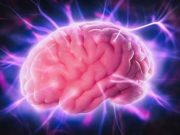Tag: Cognition and Cognitive Therapy
Variety of Digital Apps Aid Mental Health Symptoms in Adults
Authors say digital interventions may aid patients waiting for care
Web-Based Self-Help Intervention Beneficial for Binge Eating Disorder
Significant reduction seen in binge eating episodes and improvement seen in mental health outcomes
Clinician Burnout Reduces Efficacy of Trauma-Focused Psychotherapy
Findings seen among Veterans Affairs patients experiencing posttraumatic stress disorder symptoms
Dialectical Behavior Therapy Reduces Suicidal Behavior in Adults With Autism
Findings show short-term benefits, which are largely not preserved at 12-month follow-up
Multicomponent Intervention Aids Quality of Life With Overactive Bladder
Intervention included cognitive components and also improved frequency, urgency
In-Person, Remote Cognitive Behavioral Therapy Similarly Effective
Findings seen across a range of mental health and somatic disorders
Cognitive Therapy During Pregnancy Reduces Postnatal Depression, Anxiety
Reduction seen in odds of major depressive episode, moderate-to-severe anxiety with intervention sessions delivered by nonspecialist
Activation in Fronto-Parietal Networks Normalizes After Cognitive Therapy
Findings seen for unmedicated youths with anxiety disorder who have normalization over the course of treatment
Cognitive Therapy or Trazodone Not Effective for Insomnia in Hemodialysis
No difference seen in effectiveness of six weeks of CBT-I or trazodone compared with placebo for patients undergoing hemodialysis
MS-Specific Internet-Based Therapy Program Can Cut Depressive Symptoms
Two versions can significantly reduce depressive symptoms in patients with multiple sclerosis














